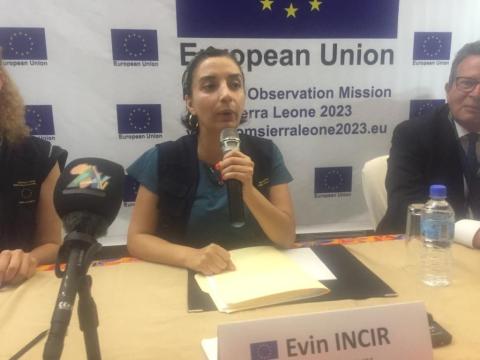By Saio Marrah
The European Union Election Observer Mission (EU EOM) for Sierra Leone’s 2023 multitier elections has indicated in its preliminary report that the Electoral Commission of Sierra Leone lacks trust, transparency, and proper communication with stakeholders and the broader public on electoral preparedness.
The report published on Monday 26th June 2023 and read out by EU EOM Chief Observer; Evin Incir at a press conference held at the Radisson Blu Hotel in Freetown further indicated that ECSL’s lack of communication and transparency affected confidence in the integrity of the elections.
It noted that before Election Day, most stakeholders expressed confidence in the ESCL’s operational capacity, but that overall perception of the ECSL was highly polarised along the political divide.
While the governing Sierra Leone People’s Party (SLPP) expressed trust in the ECSL's professionalism and impartiality, the report said the main opposition, the All People’s Congress, (APC) perceived the ECSL as biased, with the criticism rising as Election Day approached.
The report also noted that ECSL received timely disbursement of funding and appeared operationally prepared, but delays, errors, and omissions in the delivery of sensitive materials occurred on Election Day.
EU EOM also noted that ECSL held regular meetings of its Political Parties Liaison Committee in the presence of civil society and media and that while those meetings informed on key decisions and offered opportunities for discussion, ECSL’s decisions were rarely published, undermining access to information and transparency.
“Several delays and shortcomings at key stages of the electoral process occurred and were not comprehensively explained to the public, reducing confidence in the process. Those included important steps in the voter registration process,” Incir read out.
It also noted that final candidate lists for parliamentary elections were published late and contained numerous errors, late release of tallying, and result certification procedures.
The report also indicated that a stress test or a nationwide mock exercise of the results management system was not conducted and there was no public information on the security safeguards of the results management system, a measure that could have defused political tensions.
It however acknowledged that ECSL worked to address problematic issues at different stages of the electoral process and that the commission’s mitigation measures included recapturing missing voter registration data after the exhibition of the provisional list, providing special certificates to voters whose photos were missing on their voter cards.
More so, the report indicated that briefing observers and political parties on polling and counting procedures were done, “however, steps taken were not accompanied by a clear and comprehensive public outreach. By providing detailed and timely public information on those issues, the ECSL would have mitigated against distrust and enhanced certainty and institutional transparency.”
The report also noted a lack of clear and timely public explanations of technical problems related to the voter register reduced confidence in its accuracy.
While describing the introduction of gender quotas as elevating women's participation, it noted that late publication of lists interferes with voters’ right to know their candidates.
On issues of campaign environment, EU EOM indicated that initially competitive campaign turned openly confrontational, but subsequently, it was marred by violence against the opposition in several parts of the country.
According to the report, while independent fact-checkers countered disinformation, divisive messages raised agitation while aggressive and divisive messages played a significant role in online communication on political and electoral matters. It further noted that the most damaging messages were made by a diaspora blogger called Adebayor, whose calls to boycott the elections and to protests in mid-June reached at least 58,000 people on Facebook alone.
Copyright © 2023 Politico (28/06/23)








